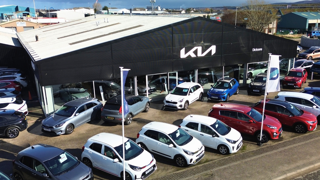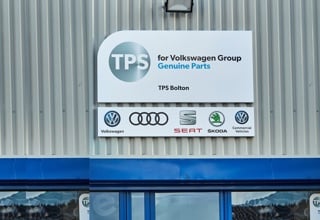There is a wind of change blowing through dealerships, bringing with it a realisation that automotive retail has to follow trends that consumers now take for granted in other sectors.
There is a wind of change blowing through dealerships, bringing with it a realisation that automotive retail has to follow trends that consumers now take for granted in other sectors.
There is a wind of change blowing through dealerships, bringing with it a realisation that automotive retail has to follow trends that consumers now take for granted in other sectors.
There is a wind of change blowing through dealerships, bringing with it a realisation that automotive retail has to follow trends that consumers now take for granted in other sectors.
The changes come in many guises, from the technological, such as using tablets and video cameras in the showroom, or online booking systems in the service department, to the human – employing people for attitude rather than car sales experience and a growing acceptance that old ways of working have to be shaped to fit the standards of service customers now expect from dealers.
♦ Click here for a full gallery of images of Knights Group's Stoke-on-Trent site
Dealers’ ongoing outpourings of praise for retail giants such as Apple and John Lewis are the most public indication of this acceptance of their need to adapt to the changed marketplace.
KNIGHTS GROUP
Knights is a three-site, privately owned group, with the Mini and BMW franchise based in Staffordshire.
Parts turnover £8,508,642
|
|
|
|
|
 |
|
|
Knights Group features on the cover of this month's issue of AM magazine. Click here to subscribe or here to register for the digital edition
|
|
While it may be small, Staffordshire-based Knights Group is punching above its weight in this drive to adapt. It is embracing new technology and working practices, not least in its workshops.
Two events helped to prompt the changes at Knights – moving its principal dealership and head office several years ago to Radial Park in Stoke on Trent and the acquisition of part of Blue Bell Group earlier this year.
Ian Dow is aftersales director for Knights Group’s three sites. “We moved here seven years ago. And with a totally different working environment came increased customer expectations on what we could deliver,” he said. “We have everything here now BMW and Mini retail and corporate customers require.”
A bodyshop was added three years ago (the work had previously been sub-contracted) and there is also a tyre centre and smart repair operation. But for a separate service reception, aftersales is managed for both brands out of the BMW dealership.
Of the 50,000 service hours the group achieves, the Stoke site is targeted to do 20,000. It handles about 55 retail and warranty customers a day – half of which are fleet – and all the group’s new and used car internal vehicle preparation is carried out here.
Of the 7,500 new and used cars sold by the group in 2013, Stoke sold 4,100.
A rise in sales volumes has meant all BMW stock (plus parts) is delivered at night. The impact on customers of sometimes having four transporters on site at once was not acceptable to the group.
Bringing the motor trade into line with other retail sectors
The opportunities presented by the new site and the resultant increase in business led to a significant challenge for the business in 2014 – the need to change working hours.
It was much needed, said Dow: “When BMW announced it would like dealers to look at changing hours it was like a breath of fresh air for me.
[page-break]“I firmly believe, in this day and age, customers should be able to have their cars serviced and repaired during hours convenient to them, not just us.
“For too long we’ve channelled people into our requirements of 7am – 6.30pm. If you want to be a true retailer you have to open over the weekend. Name a high street store that doesn’t.”
Like so many other dealers – and manufacturers – Knights looked at the Apple store model.
“You can go and have your phone looked at up to nine o’clock at night in most stores. So, why shouldn’t a customer bring his car in for a service after they have finished work and sit and have a coffee in a far more relaxed environment than trying to do it before work and then get back to us in the rush hour, possibly, to collect it?”
Dow doesn’t know why it has taken the industry so long to catch up with other retail sectors, but suggested increased costs are a factor.
“Everybody is concerned about return on investment and certainly if you want to stay open longer there is a cost. We’ve accepted we’ve had to employ more people. But we’re starting to see the benefits.”
In June, Knights North (the Stoke site) began opening from 7am until 9pm, Monday to Thursday.
It means that a while-you-wait customer who uses Knights’ ‘fast lane’ service can bring their car in up to 7.30pm and be on their way home at 9pm.
“This is a reasonable time for a customer who is on their way home from work to call in, have their car serviced and be away,” said Dow.
“If we’d have opened until 7pm, while there would have been a benefit for customers to be able to collect, I don’t see that there would be a tangible improvement in delivering service on the same day.”
All routine servicing is possible during the new opening hours. The business is also open on Saturdays, from 9am-5pm, and Sunday, from 11am-5pm, for sales and service.
The bodyshop reception is open at weekends, but the bodyshop itself is closed. However, consultation has started with staff on changing this.
Introducing the 2am MoT
Knights has also introduced a service department night shift. It carries out internal preparation and MoTs up to 2am, Monday to Thursday.
“When a customer comes in during the day, we may identify a number of issues that need resolving, and whereas before we’d probably put the customer into a courtesy car and the customer would come back the next day, we’ve now got the ability to get the customer’s car ready for the next morning,” said Dow.
“They can collect it on the way back to work from home, rather than having another day without their car. It’s made the business more efficient.”
[page-break]On Friday evenings, the business is open until 7pm, although there is some uncertainty about the level of demand from customers to have their car serviced then.
The impact of the opening hours change on staff was handled with as much sensitivity and flexibility as possible, following a series of consultations on the new schedule, dubbed ‘open all hours’.
After the launch meeting, there were departmental team meetings and then three individual consultations with staff.
Nine out of 10 staff members said they could understand why Knights was making the changes and agreed it was right for customers. However, at launch, only 60% wanted to be involved.
“This made the consultation process essential, since once you find out individual needs you tailor hours and create rotas to suit. From then onwards, the amount of staff ready to come on board increased,” Dow said. Nonetheless, as ‘open all hours’ meant changes to working conditions, the group’s HR manager was involved at every step.
While it was impossible to please everybody, Knights retained 85% of its staff after the change.
Recruiting replacements was challenging and staff were “thin on the ground” to begin with, said Dow: “While I don’t think the job market was ready for this change – and we saw a number of candidates who didn’t want to work our hours – we have been able to attract very good people.
“A lot of interviewees told us they expected this in a retail environment.”
Knights applied the philosophy of ‘recruit for attitude, not experience’ and was prepared to teach the technicalities of aftersales to those with the right mindset for extended working hours.
In some cases, former service advisers who left automotive retail for other sectors have joined Knights and for them, ‘open all hours’ is not an obstacle.
The transition went so well, in fact, that the showroom staff opted to mirror the service department’s opening hours and is now welcoming customers from 8.30am until 9pm. “It made sense when it was clear an aftersales department open for business would mean showroom traffic,” said Dow.
Reception staff changed to weekend working two years ago. There was initial opposition to giving up free time and being at home when most people were at work.
“The reception staff wouldn’t go back to the old working patterns now. This helped us convince service advisers and technicians of the importance of change,” said Dow.
[page-break]“One of our service advisers was absolutely delighted he was going to work weekends and had days off in the week because it meant he could play golf when the course was much quieter.”
Dow dismissed the suggestion that attracting new talent to the industry is hampered by a reluctance to work weekends, particularly Sundays.
“It’s a red herring. Don’t get me wrong, it’s difficult, but it’s not unachievable,” he said.
“We really want to be retailers and here for the convenience of our customers, so we have to open weekends and later in the evenings.”
Dow said more convenient opening times also had an effect on customer psychology: “Customers are far more relaxed than when we were forcing them to bend to our working times.
“If I had to do a 10-mile journey before work to try and bring my car in for a service, what additional time would I have to allow myself in the morning? How would the traffic be? I don’t think for a minute I would be in a particularly good frame of mind.
“Now, at evenings and weekends the dynamic has changed. The relationship between the service adviser and the customer can be enhanced. You would like to think that through that enhanced relationship any news we’d have to give the customer would be better received.”
Less stress on customers means less stress for staff, particularly at service reception, which is not an area known for its tranquillity during busy times.
Longer opening hours may mean more staff
Business costs have gone up at Knights since it increased its opening hours. It has not made figures available, but with a commitment not to increase any individual’s working hours, headcount needed to be increased.
Knights has employed two new service advisers, a parts adviser and a technician.
Service advisers work an average 45 hours a week, technicians 40.
Technicians do Sundays as overtime. Previously, Saturdays were done as overtime, but these are now worked with a day off in lieu.
[page-break]Service advisers work no more than five days a week. If they have to work a Saturday or Sunday they have two days off in the week. “This is a significant improvement for some who were working every other Saturday morning and now only do five-day weeks,” Dow said.
The site also operates on a rolling rota, agreed in the consultation. Service advisers, for example, have a rolling six-week shift pattern whereby they work 7am until 9pm during the week and do two Saturdays and one Sunday, with weekdays off in lieu.
To communicate the changed opening hours, Knights conducted an email campaign to current customers, but its big push was via a 12-week radio campaign on Stoke station Signal, with ads combining a sales and aftersales message
Its new location also provided an excellent opportunity to reach drivers on the traffic-prone A500. Digital signs on the side of the BMW and Mini buildings have been used to promote the ‘open all hours’ service.
A campaign for lapsed MoT customers has also been used to attract business at the weekends.
‘We’re never going back’
Despite a lack of data on whether the changes have yet had an impact, bookings for the weekend on the Monday of our interview were at 88%.
Consultation on working time changes has started at Knights South (its Stafford centre) and will begin next year at Blue Bell Crewe. “We’re never going back,” said Dow. “This is long overdue. I am firmly committed to this. ”
He said there was no way to improve business efficiency within the traditional opening hours that would have had the same impact on customer satisfaction.
“We were working the best we could within the old hours. We made changes to ensure we were, but we’ve taken an additional step to provide what we should have been offering years ago.”
One of those changes was asking customers to take a photograph or record video or audio of a fault on their smartphone when booking an appointment. They then email this to a service adviser to help ensure a correct diagnosis of a problem first time.
UsIng video to increase speed and customer trust
Knights has also incorporated CitNow’s video technology in its business since January and it is now standard practice for all aftersales activities.
Currently, Knights uses CitNow in two of its three dealerships and there are plans to implement the technology in the third, with a target of producing a minimum of 10 videos per dealership per day. It takes a technician two minutes to create a video on average.
Dow said: “There is a direct correlation between the number of videos that we do and the success of our electronic vehicle health checks.
“CitNow also enhances the trust between the customer and the dealership; by being able to put the problem in front of the customer right away, wherever he or she may be, we can immediately solve any potential doubts or hesitations.”
For Knights, the main advantage is not only the trust that technology helps build between the customer and the dealership, but also the fact that it makes the whole operation quicker, which is particularly important for ‘red’ work.
By enabling instant decision-making by the customer, technicians can start doing the requisite work right away, saving time and making the process more efficient for both dealership and customer, said Dow.
Technicians will also go out on road tests in customers’ cars, to help establish the fault.
Two days before a car is due in, Dow’s team assesses the booking to establish, via BMW’s PuMa database, whether the problem has been reported previously. If so, the parts can be ordered in advance.
[page-break]Dow also defends the “first time fix” measure, regardless if it takes a number of days.
“If the car is here for three days, for example, but the customer never has to come back with the same complaint, most would accept that,” he said.
Measuring customer retention is also very difficult, Dow said, when BMW customers change a car on average every two years and four months.
“We have a window of two years before a car needs a scheduled service, to see a customer if something goes wrong. In reality, it could be four years before you see a customer for a second visit. And within that time it is not unlikely the customer has bought another car,” he said.
So where is the long-term secure business coming from? How does Dow know that Knights is winning customer loyalty?
“Within the first three years from new, hopefully the car will have the BMW Service Inclusive service plan (which has greater than 80% penetration) or a Mini TLC (99%) and the customer is going to come back for service and repairs.”
He also highlighted the transient habits of today’s new car buyers. “Traditionally, a good measure of retention was how many retained service customers bought another new car from you. Now, with the growth in PCPs, customers will go to the dealer that can offer them the best monthly payment. This is not specific to brand – it’s now a way of life.
“We have customers who have used us for years, and they will carry on using us for years. They wouldn’t think of buying their new car anywhere else.
“Likewise, we have customers that we would see for two or three years and give great service to and they’ll openly say they’ve received great service. Then they’ll buy their car from another dealer because it was cheaper.”
Like many dealer groups, Knights has embraced technology, such as video and online service booking, to address these and other aftersales challenges. But it is the combination with its focus on the human side, bringing the business into line with modern retail expectations through extended opening hours, that Dow believes gives it the best opportunity to meet the increasing demands of customers.
Electric cars ‘still have a service schedule’
Knights North, in Stoke-on-Trent, is a ‘high-voltage’ dealer, which means it can carry out repairs on BMW’s new all-electric i3 and i8 models.
Dow believes the cars’ familiarity will ease their adoption, for drivers and dealers.
“They still have a service schedule; they still have brakes and pollen filters that need replacing. To an owner, the charging requirements are all that’s new. For us, there’s been investment in training and the charging points, but apart from that everything is the same. Such familiarity will smooth the transition from the internal combustion engine.”
Login to continue reading
Or register with AM-online to keep up to date with the latest UK automotive retail industry news and insight.





















busterrabbit - 26/11/2014 12:27
Working on similar assumptions to Knights to give customers more choice/convenience, back in the early '80s the Sytner BMW workshops in Nottingham were open from 07:00am until 11:00pm. We used to work either an early or late shift with a handover period from 3-3:30pm. The biggest problem was getting customers to come in outside of the "normal" working day. Calling customers at 10:00pm asking for authorisation for extra work wasn't well received either. I guess the same would apply to requests to fleets via 1Link. We actually ended up doing mostly internal work in the evenings, so there was an improvement in retail lead times, but I guess the extra costs weren't recovered and after a year or so the system was dropped and we returned to normal hours. Most people are reluctant to "lose" their car during their leisure time, yes they'll have a distress purchase like tyres fitted; it usually doesn't take long and there are few variables. Taking your car for a service in the evening and "having a coffee" which turns into pads/discs and missing your evening meal/putting your kids to bed is not for the majority. It might help reduce unnecessary upsell though, with customers itching to leave to get home.